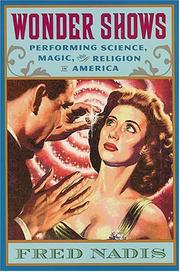| Listing 1 - 2 of 2 |
Sort by
|

ISBN: 0813541212 9780813541211 081353898X 9780813538983 0813535158 9780813535159 Year: 2005 Publisher: New Brunswick, N.J. Rutgers University Press
Abstract | Keywords | Export | Availability | Bookmark
 Loading...
Loading...Choose an application
- Reference Manager
- EndNote
- RefWorks (Direct export to RefWorks)
Imagine a stage full of black cats emitting electrical sparks, a man catching bullets with his teeth, or an evangelist jumping on a transformer to shoot bolts of lightning through his fingertips. These and other wild schemes were part of the repertoire of showmen who traveled from city to city, making presentations that blended science with myth and magic. In Wonder Shows, Fred Nadis offers a colorful history of these traveling magicians, inventors, popular science lecturers, and other presenters of “miracle science” who revealed science and technology to the public in awe-inspiring fashion. The book provides an innovative synthesis of the history of performance with a wider study of culture, science, and religion from the antebellum period to the present. It features a lively cast of characters, including electrical “wizards” Nikola Tesla and Thomas Alva Edison, vaudeville performers such as Harry Houdini, mind readers, UFO cultists, and practitioners of New Age science. All of these performers developed strategies for invoking cultural authority to back their visions of science and progress. The pseudo-science in their wonder shows helped promote a romantic worldview that called into question the absolute authority of scientific materialism while reaffirming the importance of human spirituality. Nadis argues that the sensation that these entertainers provided became an antidote to the alienation and dehumanization that accompanied the rise of modern America. Although most recent defenders of science are prone to reject wonder, considering it an ally of ignorance and superstition, Wonder Shows demonstrates that the public’s passion for magic and meaning is still very much alive. Today, sales continue to be made and allegiances won based on illusions that products are unique, singular, and at best, miraculous. Nadis establishes that contemporary showmen, corporate publicists, advertisers, and popular science lecturers are not that unlike the magicians and mesmerists of years ago.
Science news --- Magic shows --- Revivals --- Protracted meetings (Revivals) --- Revival (Religion) --- Evangelistic work --- Amusements --- News, Science --- Popularization of science --- Science --- Communication in science --- Journalism --- Technical writing --- History --- Popularization
Book
ISBN: 1283278588 9786613278586 0520950526 9780520950528 9780520270466 9780520270473 0520270479 0520270460 9781283278584 6613278580 Year: 2011 Publisher: Berkeley University of California Press
Abstract | Keywords | Export | Availability | Bookmark
 Loading...
Loading...Choose an application
- Reference Manager
- EndNote
- RefWorks (Direct export to RefWorks)
From risqué cabaret performances to engrossing after-hours shop talk, Trade of the Tricks offers an unprecedented look inside the secretive subculture of modern magicians. Entering the flourishing Paris magic scene as an apprentice, Graham M. Jones gives a firsthand account of how magicians learn to perform their astonishing deceptions. He follows the day-to-day lives of some of France's most renowned performers, revealing not only how secrets are created and shared, but also how they are stolen and destroyed. In a book brimming with humor and surprise, Jones shows how today's magicians marshal creativity and passion in striving to elevate their amazing skill into high art. The book's lively cast of characters includes female and queer performers whose work is changing the face of a historically masculine genre.
Magic tricks. --- Magic. --- Magician. --- Magic tricks --- anthropology of magic. --- art of magic. --- aspiring magicians. --- books for magicians. --- cabaret performances. --- card tricks. --- close up magic. --- cultural anthropology. --- culture of magic. --- david blaine. --- david copperfield. --- famous magicians. --- french anthropology. --- french magic. --- french magicians. --- harry houdini. --- history of magic. --- magic and allusion. --- magic and illusion. --- magic entertainment. --- magic performance. --- magic shows. --- magic tricks. --- magic. --- magician tricks. --- modern magicians. --- paris magic scene. --- paris magicians. --- performers. --- sociology of magic.
| Listing 1 - 2 of 2 |
Sort by
|

 Search
Search Feedback
Feedback About UniCat
About UniCat  Help
Help News
News